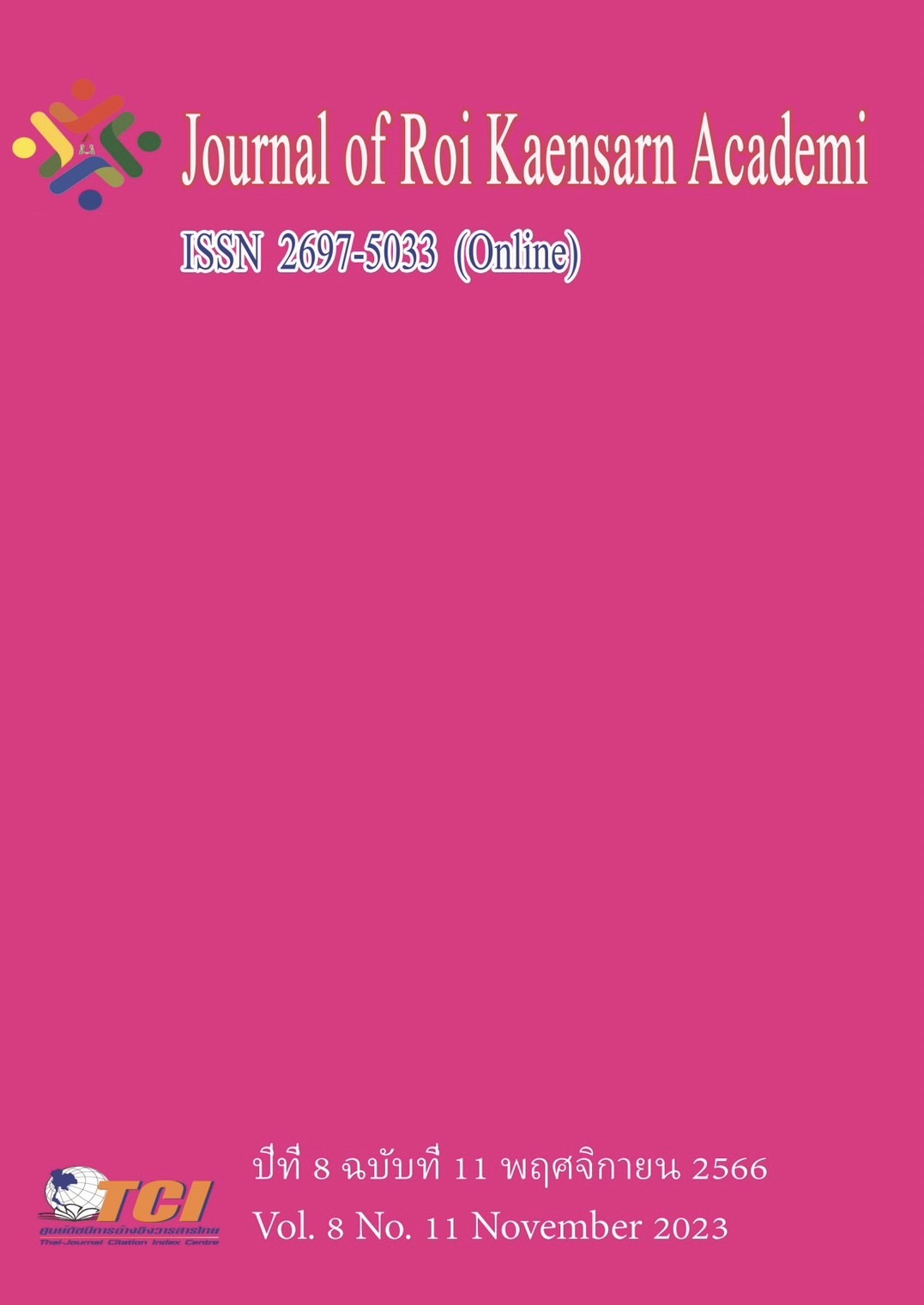Exploring AI-Assisted Teacher Support Mechanism for University Students' Learning Engagement
Main Article Content
บทคัดย่อ
The application of artificial intelligence in the field of education has been expanding rapidly. AI-assisted systems can provide educators with enhanced teaching support and resources, leading to increased attention on the relationship between teacher support and student learning engagement. Academic research indicates that student learning engagement serves as a crucial indicator for evaluating educational quality, exerting positive effects on academic performance and personal development. Therefore, exploring the underlying principles and external conditions that foster student learning engagement becomes paramount. Student learning engagement represents a dynamic state, influenced by the support provided by educators within the learning environment. Despite the acknowledged significance of teacher support, the existing literature still lacks an in-depth understanding of the mechanisms through which teacher support impacts learning engagement. Hence, this study approaches the subject from the perspective of AI-assisted systems, aiming to investigate the influence of teacher support on university students' learning engagement.
Article Details
เอกสารอ้างอิง
An, X., & Liu, Y. (2018). Research on the correlation between sports activities and academic achievement. Teaching and Management, (15), 24-27.
Bai, H. (2016). Research on the relationship between academic emotions and academic achievement of middle school students. Modern Primary and Secondary Education, (1), 83-87.
Bates, A. W. (2016). Automation or empowerment: Where is online learning heading? China Distance Education, (4), 5-11, 79.
Brewster, A. B., & Bowen, G. L. (2004). Teacher support and the school engagement of Latino middle and high school students at risk of school failure. Child and Adolescent Social Work Journal, 21(1), 47-67.
Chen, J. J.-L. (2005). Relation of academic support from parents, teachers, and peers to Hong Kong adolescents’ academic achievement: The mediating role of academic engagement. Genetic, Social, and General Psychology Monographs, 131(2), 77-127.
Chen, J. J.-L. (2008). Grade-level differences: Relations of parental, teacher and peer support to academic engagement and achievement among Hong Kong students. School Psychology International, 29(2), 183-198.
Chen, S., Zhang, W., & Li, Y. (2020). Research on the influence of parental involvement on children's school adaptation: The multiple mediating effects of teacher support and children's self-efficacy. Chinese Journal of Special Education, (12), 76-82+75.
Contact North. (2018). Artificial intelligence in post-secondary online learning: A landscape review. https://teachonline.ca/sites/default/files/tools-trends/downloads/2018_ai_landscape.pdf
EDUCAUSE. (2018). The horizon report. https://library.educause.edu/-media/ files/ library/ 2018/8 /2018 horizonreport.pdf
EDUCAUSE. (2019). The horizon report. https://library.educause.edu/resources/2019/4/2019-horizon-report
Finn, J. D. (1989). Withdrawing from school. Review of Educational Research, 59(2), 117-142.
He, Y. (2018). Design and implementation of computer network teaching system based on artificial intelligence. Digital World, (10), 213-214.
Jin, Q. (2020). Research on classroom evaluation assistant system based on artificial intelligence. Science and Education Journal, (6), 43-44.
Johnson, J. K., & Sinatra, G. M. (2013). Use of task-value instructional inductions for facilitating engagement and conceptual change. Contemporary Educational Psychology, 38(1), 51-63.
Kolb, D. A. (1984). Experiential learning: Experience as the source of learning and development (Vol. 1). Englewood Cliffs, NJ: Prentice-Hall.
Lam, S. F., Wong, B. P., Yang, H., & Liu, Y. (2014). Understanding student engagement with a contextual model. In Handbook of research on student engagement (pp. 403-419). Springer.
Li, H. (2023). The application of artificial intelligence in education. Journal of Educational Technology, 2(1), 5-10.
Liu, N., & Jew, L. (2019). Mechanisms of the impact of AI-assisted teacher support on university students' learning engagement. International Journal of Artificial Intelligence in Education, 30(2), 142-156.
Ma, J. (2019). Design and application research of intelligent teaching system based on artificial intelligence technology. Computer Programming Skills and Maintenance, (9), 135-137.
McCarthy, J. (1956). The Dartmouth summer research project on artificial intelligence. AI Magazine, 27(4), 12-12.
Ouyang, D. (2005). Teacher support and students’ perceived life satisfaction. Chinese Journal of Applied Psychology, 11(1), 14-19.
Qi, J., & Zhong, Y. (2019). Beijing consensus: Promoting the systemic integration of artificial intelligence with education, teaching, and learning-the summary of the international conference on artificial intelligence and education. Information Technology Education in Primary and Secondary Schools, (6), 31-32.
Sun, X. (2019). Research on the application of artificial intelligence technology in computer-aided teaching. Parents, (2), 24-25.
Tinto, V. (1975). Dropout from higher education: A theoretical synthesis of recent research. Review of Educational Research, 45(1), 89-125.
Trickett, E. J., & Moos, R. H. (1973). Social environment of junior high and high school classrooms. Journal of Educational Psychology, 65(1), 93.
Wang, P. (2018). Influence of teacher autonomy support and self-determination motivation on academic engagement and academic achievement of high school students [Doctoral dissertation, Nanjing Normal University].
Wellborn, J. G. (1991). Engaged and disaffected action: The conceptualization and measurement of motivation in the academic domain [Doctoral dissertation, University of Rochester].
Ye, B., Hu, X., Yang, Q., & Hu, Z. (2014). The influence mechanism of perceived social support, coping self-efficacy, and stressful life events on adolescents' academic achievement. Psychological Science, 37(2), 342-348.
Zeng, R., & Li, X. (2003). On the impact of self-efficacy on students' academic achievement. Educational Research and Experiment, (4), 53-55.
Zhang, X. (2020). The application of artificial intelligence in education. Modern Educational Technology, 6, 39-45.
Zhang, X. H. (2020). Feasibility study of artificial intelligence-assisted teaching system. Papermaking Equipment and Materials, (2), 175+219.
Zhihui, J. (2018). Research on online teaching assistant system based on artificial intelligence. Modern Educational Technology, 28(9), 92-97.
Zhou, H., & Zhang, Z. (2019). Analysis of the application of AI artificial intelligence in teaching. Shandong Industrial Technology, (22), 222+205.
Zhuang, Y. (2020). Current situation and path exploration of artificial intelligence-assisted teaching system promotion in public schools. Science and Education Journal-Electronic Edition (Second Half of the Month), (3), 1.

